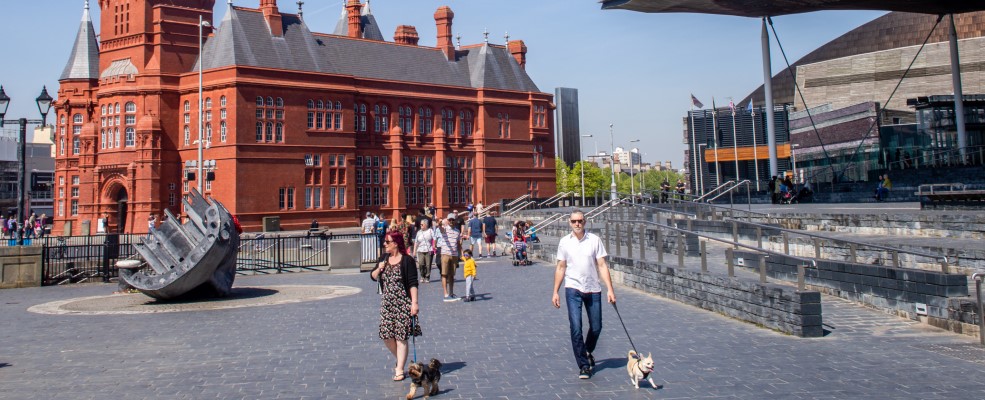Research explores how communities can work together to bring about positive change.
Academics will investigate how citizens, civil society organisations and policymakers are collaborating to tackle some of society’s most pressing problems.
WISERD has secured £1.6m of funding from the UKRI Economic and Social Research Council (ESRC) for the three-year research programme, ‘People, Places, and the Public Sphere’.
The programme will examine ways in which people’s participation in democratic activities, collaborative governance and citizen science can address urgent collective challenges.
The programme comprises four research themes:
- Workplaces and participatory democracy will focus on the Fair Work Agenda, including Wales’s progress in moving towards being a Fair Work Nation.
- Rights, refugees and marginalised communities will examine the role of civil society organisations in supporting refugees and state surveillance of Gypsy, Roma and Traveller communities.
- Collaborative governance and deliberative politics will look at new and innovative ways to support the collaborative engagement of citizens in policymaking and to counter polarisation.
- Local economies and place-based innovations will explore ways of involving economic actors in developing local leadership, resilience and capital to support economic growth.
These themes will be supported by the development of a place-based and public-facing WISERD Data Lab. This will support community-led data collection to enable citizens, communities, and policymakers to play their part in co-production projects.
The results of this research will contribute to policy and practices that fully enable citizen participation, deepen engagement with citizen science, and ultimately, enable local communities to mobilise assets and resources in response to social, economic, political, and environmental challenges. WISERD will also continue to expand its international and civil society research networks.
Principal investigator and WISERD co-director, Rhys Davies, said:
WISERD’s interdisciplinary research has already made an enormous impact on social science in Wales. This new funding will allow us to expand and strengthen this work even further, based upon principles of co-production, collaboration and citizen science, while working more deeply with our growing networks of civil society partners.
WISERD co-director at Aberystwyth University, Dr Anwen Elias, said: “We are thrilled to be part of this new research programme, which will enable us to work with academic and community partners in Wales and beyond, on issues of participation and partnership in civil society. The funding will support us to develop innovative approaches to citizen and community involvement in local and national governance”.
Dr Jesse Heley, also a WISERD co-director at Aberystwyth University, continued: “As well as taking new, community-centred projects forward, this investment will also allow us to build upon previous UKRI ESRC-funded civil society research, ensuring that relationships are taken forward in a meaningful way and facilitate ongoing impact. For example, this programme includes testing techniques and strategies for avoiding and countering polarisation, and the co-production of a community toolkit. A process being led by Dr Amy Sanders, also at Aberystwyth University, this underscores the importance placed on meaningful outcomes for research.”
At Bangor University, the new ESRC funding will enable WISERD to extend existing research focus on civil society support for marginalised communities and their experience of multiple levels of disadvantage, as well as adverse state attention – through, for example, increased state surveillance practices. Work here will focus on Gypsy, Roma and Traveller communities.
In addition, working with Environment Centre Wales, in partnership with the Centre for Ecology and Hydrology, WISERD will be mapping co-produced innovation in local economies linked to sustainable food and energy production, flooding prevention, responses to pollution, and land management.
WISERD co-director at Bangor University, Professor Martina Feilzer, said: “This is an exciting opportunity to continue our research on experiences of marginalised communities and the role of civil society in building resilience and resistance to such marginalisation.”
Dr Robin Mann, also a WISERD co-director at Bangor University, continued: “Similarly, we are looking to illustrate how community innovation contributes to sustainability. We will be welcoming a new researcher to Bangor for these exciting projects and look forward to the next three years.”
At Cardiff University, a key aspect of this work will be to grow WISERD’s data infrastructure through its Data Lab. WISERD co-director, Professor Scott Orford, said: “Our co-creation of community open data, data dashboards and mapping platforms which addresses the needs of civil society organisations, public bodies and community stakeholders will deliver both innovative research and provide a basis for future research collaborations”.
At the University of South Wales, the latest project will adopt the interdisciplinary, mixed-method, and comparative approaches that were developed in previous phases of funding.
WISERD co-director at the University of South Wales, Professor Gary Higgs, said: “Research to date has involved enhancing GIS-based measures of accessibility to a wide range of public and private services.
“Underpinning our work is the need to obtain a fuller picture of the equity implications of provision that accounts for both public transport availability and service characteristics. Combining public transport with other travel modes will help us to better understand inequalities in access to job and educational opportunities, cultural and sporting events, and essential day-to-day services.”
The Swansea University team, led by WISERD co-directors, Professor Nigel O’Leary and Dr Matthew Wall, will spearhead innovative research and practice at the intersection of democratic and economic renewal.
Professor Nigel O’Leary, said: “Within this multi-themed and cross-disciplinary research, we will be focussed upon developing policies that enhance inclusive economic development, reduce vulnerabilities, and foster forms of community capital as a vehicle for economic and social growth.
“This will be an exciting opportunity to shape and deliver an ambitious set of work packages that have far-reaching and consequential impacts across the areas of economics, education, and social policy.”
Dr Matthew Wall added: “Through this work, we aim to bridge academic research with practical solutions that empower communities and enhance democratic participation while addressing pressing economic challenges.”

